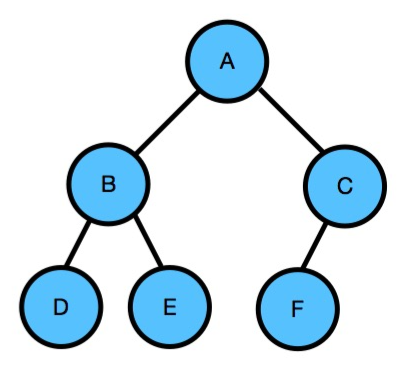PHP实现二叉树的遍历
作者:勇康博客网 | 分类:PHP | 浏览:2243 | 日期:2022年02月08日二叉树基本概念
二叉树(Binary tree)是树形结构的一个重要类型。许多实际问题抽象出来的数据结构往往是二叉树形式,即使是一般的树也能简单地转换为二叉树,而且二叉树的存储结构及其算法都较为简单,因此二叉树显得特别重要。
二叉树特点是每个结点最多只能有两棵子树,且有左右之分。
详细介绍请参考:二叉树的概念
遍历类型
由于二叉树每个节点有不同的方向,所以我们必须指定一个遍历的顺序,不同的遍历顺序得到的结果也不一样,所以一般分为深度优先遍历(前序遍历,中序遍历,后续遍历),和广度优先遍历(层序遍历)。
对于前序遍历,中序遍历,后续遍历而言,是以根节点为主,根在前表示前序,根在中间表示中序,根在后,表示后续,而左右两个节点按照左在前,右在后的顺序,所以,这三种遍历的方式他们的顺序分别是:
前序遍历:访问根结点->遍历左子树->遍历右子树
后续遍历:遍历左子树->遍历右子树->访问根结点
中序遍历:遍历左子树->访问根结点->遍历右子树
如下图二叉树:

深度优先遍历 | 先序遍历 | 中序遍历 | 后序遍历 |
解释 | 对任一子树,先访问根,然后遍历其左子树,最后遍历其右子树。 即根节点->左子树->右子树。 | 对任一子树,先遍历其左子树,然后访问根,最后遍历其右子树。 即左子树->根节点->右子树。 | 对任一子树,先遍历其左子树,然后遍历其右子树,最后访问根。 即左子树->右子树->根节点。 |
原则 | ①输出根。 ②访问左子树。【先访问左子树中的左子树,再访问左子树中的右子树。】直到访问到叶子节点后输出。 ③访问右子树。【先访问右子树中的左子树,再访问右子树中的右子树。】直到访问到叶子节点后输出。 | ①访问左子树。【先访问左子树中的左子树,再访问左子树中的右子树。】直到访问到叶子节点后输出。 ②输出根。 ③访问右子树。【先访问右子树中的左子树,再访问右子树中的右子树。】直到访问到叶子节点后输出。 | ①访问左子树。【先访问左子树中的左子树,再访问左子树中的右子树】。直到访问到叶子节点后输出。 ②访问右子树。【先访问右子树中的左子树,再访问右子树中的右子树】。直到访问到叶子节点后输出。 ③再返回访问根,并输出。 |
遍历步骤 | A作为根,先输出A。 从A开始,先访问A的左子树。B为左子树的根节点,输出B。B的左子树为D,输出D。D无左右子树,则看B的右子树,为E,输出E。E无左右子树,则A的左子树全部输出完。 再访问A的右子树,C为右子树的根节点,输出C。C的左子树为F,输出F。F无左右子树,且C无右子树,A的右子树全部输出完。 | A作为根。从A开始,先访问A的左子树。 B的左子树为D,输出D。D无左右子树,则B的左子树已访问完,访问并输出B。再看B的右子树,为E,输出E。E无左右子树,则A的左子树全部输出完,返回并输出A。 同理,再看A的右子树。 C的左子树为F,输出F。F无左右子树,则C的左子树已访问完,返回并输出C。C无右子树,则A的右子树全部输出完。 | 先访问A的左子树。再访问左子树中的左子树。即A的左子树为B,再访问B的左子树D。D没有左右子树,输出D。 然后访问左子树中的右子树。即访问B的右子树E,E没有左右子树,输出E。再输出B。 然后访问A的右子树。再访问右子树中的左子树。即A的右子树为C,再访问C的左子树F。F没有左右子树,输出F。 然后访问右子树中的右子树。即访问C的右子树,C没有右子树,输出C。再输出A。 |
遍历结果 | A(BDE)(CF) | (DBE)A(FC) | (DEB)(FC)A |
php用递归、非递归方式实现深度优先遍历二叉树
1、先序遍历
<?php
class Node {
public $value;
public $left;
public $right;
}
class BT {
// 非递归
// 前序遍历 根节点→左子树→右子树
// 先访问根节点,再遍历左子树,最后遍历右子树;并且在遍历左右子树时,仍需先遍历根节点,然后访问左子树,最后遍历右子树
public function preOrder($root) {
$stack = array();
array_push($stack, $root);
while (!empty($stack)) {
$center_node = array_pop($stack);
echo $center_node->value . " "; // 先输出根节点
if ($center_node->right != null) {
array_push($stack, $center_node->right); // 压入左子树
}
if ($center_node->left != null) {
array_push($stack, $center_node->left);
}
}
}
// 递归
// 前序遍历
public function pre_order($root) {
if ($root != null) {
echo $root->value . " "; // 根
if ($root->left != null) {
$this->pre_order($root->left); //递归遍历左树
}
if ($root->right != null) {
$this->pre_order($root->right); //递归遍历右树
}
}
}
}
// 测试
$a = new Node();
$b = new Node();
$c = new Node();
$d = new Node();
$e = new Node();
$f = new Node();
$a->value = "A";
$b->value = "B";
$c->value = "C";
$d->value = "D";
$e->value = "E";
$f->value = "F";
$a->left = $b;
$a->right = $c;
$b->left = $d;
$b->right = $e;
$c->left = $f;
$bst = new BT();
echo "----深度优先----";
echo "</br>";
echo "非递归--前序遍历:";
$bst->preOrder($a);
echo "</br>";
echo "递归--前序遍历:";
$bst->pre_order($a);
PHP用递归、非递归方式实现二叉树的先序遍历2、中序遍历
class Node {
public $value;
public $left;
public $right;
}
class BT {
// 非递归
// 中序遍历
// 左子树→根节点→右子树
public function inOrder($root) {
$stack = array();
$current_node = $root;
while (!empty($stack) || $current_node != null) {
while ($current_node != null) {
array_push($stack, $current_node);
$current_node = $current_node->left;
}
$current_node = array_pop($stack);
echo $current_node->value . " ";
$current_node = $current_node->right;
}
}
// 递归
// 中序遍历
public function in_order($root) {
if ($root != null) {
if ($root->left != null) {
$this->in_order($root->left); // 递归遍历左树
}
echo $root->value . " ";
if ($root->right != null) {
$this->in_order($root->right); // 递归遍历右树
}
}
}
}
// 测试
$a = new Node();
$b = new Node();
$c = new Node();
$d = new Node();
$e = new Node();
$f = new Node();
$a->value = "A";
$b->value = "B";
$c->value = "C";
$d->value = "D";
$e->value = "E";
$f->value = "F";
$a->left = $b;
$a->right = $c;
$b->left = $d;
$b->right = $e;
$c->left = $f;
$bst = new BT();
echo "----深度优先----";
echo "</br>";
echo "非递归--中序遍历:";
$bst->inOrder($a);
echo "</br>";
echo "递归--中序遍历:";
$bst->in_order($a);
echo "</br>";
PHP用递归、非递归方式实现二叉树的中序遍历3、后序遍历
<?php
class Node {
public $value;
public $left;
public $right;
}
class BT {
// 非递归
// 后序遍历 左子树→右子树→根节点
// 先遍历左子树,然后遍历右子树,最后访问根节点;同样,在遍历左右子树的时候同样要先遍历左子树,然后遍历右子树,最后访问根节点
public function postOrder($root) {
$stack = array();
$out_stack = array();
array_push($stack, $root);
while (!empty($stack)) {
$center_node = array_pop($stack);
array_push($out_stack, $center_node); // 最先压入根节点,最后输出
if ($center_node->left != null) {
array_push($stack, $center_node->left);
}
if ($center_node->right != null) {
array_push($stack, $center_node->right);
}
}
while (!empty($out_stack)) {
$center_node = array_pop($out_stack);
echo $center_node->value . " ";
}
}
// 递归
// 后序遍历
public function post_order($root) {
if ($root != null) {
if ($root->left != null) {
$this->post_order($root->left); // 递归遍历左树
}
if ($root->right != null) {
$this->post_order($root->right); // 递归遍历右树
}
echo $root->value . " "; // 根
}
}
}
// 测试
$a = new Node();
$b = new Node();
$c = new Node();
$d = new Node();
$e = new Node();
$f = new Node();
$a->value = "A";
$b->value = "B";
$c->value = "C";
$d->value = "D";
$e->value = "E";
$f->value = "F";
$a->left = $b;
$a->right = $c;
$b->left = $d;
$b->right = $e;
$c->left = $f;
$bst = new BT();
echo "----深度优先----";
echo "</br>";
echo "非递归--后序遍历:";
$bst->postOrder($a);
echo "</br>";
echo "递归--后序遍历:";
$bst->post_order($a);
echo "</br>";
PHP用递归、非递归方式实现二叉树的后序遍历PHP用递归、非递归方式实现广度优先遍历二叉树
层序遍历
<?php
class Node {
public $value;
public $left;
public $right;
}
class BT {
// 非递归
public function levelOrder($root) {
if ($root == null) {
return;
}
$node = $root;
$queue = array();
array_push($queue, $node); // 根节点入队
while (!empty($queue)) { // 持续输出节点,直到队列为空
$node = array_shift($queue); // 队首元素出队
echo $node->value . " ";
// 左节点先入队
if ($node->left != null) {
array_push($queue, $node->left);
}
// 然后右节点入队
if ($node->right != null) {
array_push($queue, $node->right);
}
}
}
// 递归
// 获取树的层数(最大深度)
function getDepth($root) {
if ($root == null) { // 节点为空
return 0;
}
if ($root->left == null && $root->right == null) { // 只有根节点
return 1;
}
$left_depth = $this->getDepth($root->left);
$right_depth = $this->getDepth($root->right);
return ($left_depth > $right_depth ? $left_depth : $right_depth) + 1;
// return $left_depth > $right_depth ? ($left_depth + 1) : ($right_depth + 1);
}
public function level_order($root) {
// 空树或层级不合理
$depth = $this->getDepth($root);
if ($root == null || $depth < 1) {
return;
}
for ($i = 1; $i <= $depth; $i++) {
$this->printTree($root, $i);
}
}
public function printTree($root, $level) {
// 空树或层级不合理
if ($root == null || $level < 1) {
return;
}
if ($level == 1) {
echo $root->value;
}
$this->printTree($root->left, $level - 1);
$this->printTree($root->right, $level - 1);
}
}
// 测试
$a = new Node();
$b = new Node();
$c = new Node();
$d = new Node();
$e = new Node();
$f = new Node();
$a->value = "A";
$b->value = "B";
$c->value = "C";
$d->value = "D";
$e->value = "E";
$f->value = "F";
$a->left = $b;
$a->right = $c;
$b->left = $d;
$b->right = $e;
$c->left = $f;
$bst = new BT();
echo "----广度优先----";
echo "</br>";
echo "非递归:";
$bst->levelOrder($a);
echo "</br>";
echo "递归:";
$bst->level_order($a);
PHP用递归、非递归方式实现二叉树的层次遍历

